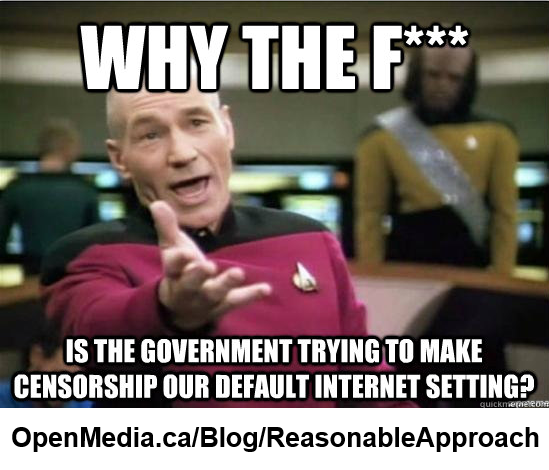A government-imposed Internet filter
Who should decide what websites you can access online? The answer is obvious: You. We’ve all heard scary censorship stories, in which oppressive governments block access to information, and only allow residents of a nation to see, read, or watch what rulers permit. These stories usually start off slowly—with justifiable censorship activities taking place for the supposed wellbeing of the nation—and escalate quickly. That’s why we worry when democratic governments start to discuss mandatory Internet censorship.
Before I go on, I want to be clear: Of course we need to enforce the law online. Actual illegal material should be dealt with by law enforcement officials by way of the legal process. No one’s questioning that. But when it comes to content that is simply deemed distasteful, the decision to access or to abstain should be in the hands of the citizen – you.
So why, then, are our governments talking about making censorship the default for the Internet in the U.K. and Canada?
You read that correctly. U.K. Prime Minister David Cameron has announced that by the end of the year, a new Internet filter will begin blocking access to “corroding influences” online by default.
And here in Canada, Conservative MP Joy Smith (Kildonan-St. Paul) has said that Cameron is on the right track and our nation should follow suit.
While we appreciate that the U.K. and Canada want to ensure that residents have a pleasant and wholesome experience online, there’s no justifiable reason that any government should be defining what that means for its population. Internet users should enjoy equally easy access to any of the legal content they want – regardless of whether the state agrees with their decisions.
The discussion, of course, is good to have – we should be concerned about the content that influences us and our children. But having the government’s points of view imposed on society by default is clearly not the way to go. It’s simply out of sync with our basic freedoms and the notion of personal responsibility.
So why not an opt-in filter? We all know that defaults are powerful, and that most people never change them.
Why force Internet users to specify what kinds of “corroding influence” they’d like to access? It’s more than just awkward – it’s the government passive-aggressively telling us what is right and wrong, and in so doing shaping our behaviour.
Why not give us a choice of browser protection systems, and allow that industry to develop? Mandatory filtration is a huge threat to our digital economy. Legal online businesses would be threatened, and as the Open Rights Group points out, the threat isn’t limited to those services that fall into the “corroding influences” category. Independent services for social networking, e-commerce, and more would face the threat of diminishing visits due to their potential for being blocked compared to more prominent services.
The Open Rights Group adds that Internet providers may also face additional costs, including the cost of dealing with increased complaints as customers who hadn't paid much attention find websites unexpectedly blocked. The last thing we need is another reason for ISPs to raise prices, and make our Internet even less affordable.
These questions must be answered before governments start putting these filters on our communications systems. And of course, we must also ask the following:
What could go wrong?
Problems are already arising with the Internet filtration system in the UK. In speaking with ISPs, for example, the Open Rights Group discovered that the UK’s censorship tool will come equipped to block a wide range of legal content—from websites about alcohol to online forums to web-blocking circumvention tools. As digital rights expert Cory Doctorow puts it:
You may be saying to yourself, hell, how are they going to be able to sort out which websites are unacceptably pornographic, let alone which sites are "smoking" related? That's a damned good question, and the answer is "with the broadest brush possible."
Additionally, according to news site TorrentFreak and other sources, the filter “will be something controlled and administered remotely.” Doctorow warns:
Huge chunks of the Internet will be effectively unreachable, and which sites go into the censorship bucket will be decided upon in secret, by unelected employees of big corporations, like China's Huawei.
That’s not just speculation. The BBC recently revealed that the UK’s filtration system, HomeSafe, is actually run by Huawei—a company which the UK’s Intelligence and Security Committee (ISC) worries is linked to the Chinese state. In a report, the ISC expressed “suspicion as to whether Huawei’s intentions are strictly commercial or are more political.”
The long and short
Concerns about accuracy, data security, and the digital economy aside, one thing remains clear: No kind of top-down Internet censorship is acceptable in a democratic nation.
If a law-abiding Canadian wants access to legal content, they shouldn’t have to find an opt-out option to do so.
A government-imposed Internet filter is clearly not the way to go. Instead, let’s talk about protecting our children in a way that respects our communications freedoms. Let’s talk about innovative solutions that put the power in users’ hands, not the government’s. Let’s talk about a reasonable approach.


 Take action now!
Take action now!
 Sign up to be in the loop
Sign up to be in the loop
 Donate to support our work
Donate to support our work